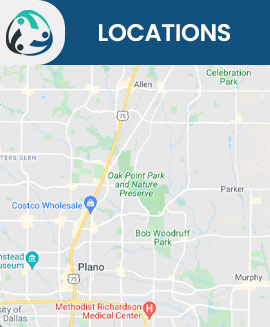Bone Pain Specialist in Allen TX
Bone pain is characterized by intense soreness, hurting, or discomfort in one or more bones. Dr. Steven L. Remer, MD., at American Pain and Wellness, offers a wide range of effective treatments for individuals suffering from bone pain. For more information, contact us or schedule an appointment online. We are conveniently located at 1101 Raintree Circle #240 Allen, Texas 75013.




Table of Contents:
What causes pain in the bones?
What are the warning signs of bone cancer?
When should I be worried about bone pain?
What does bone cancer pain feel like?
Bone pain can be caused by a variety of factors. Understanding the underlying causes is essential for effective pain management. One common cause of bone pain is injury or trauma, such as fractures, sprains, and bone bruises. These injuries typically result in intense, localized pain and tenderness.
Bone pain can also be a symptom of certain medical conditions. Conditions like osteoporosis, osteoarthritis, and rheumatoid arthritis often cause chronic bone pain due to inflammation, joint degeneration, or weakened bones. Infections, such as osteomyelitis, can also cause bone pain.
In some cases, bone pain can be associated with cancer. Bone metastasis, which is the spread of cancer cells to the bones, can cause severe pain. Additionally, certain blood disorders like leukemia or multiple myeloma can cause bone pain.
It’s important to consult with a healthcare professional if you’re experiencing persistent or severe bone pain. Our team can evaluate your symptoms, perform diagnostic tests, and develop a treatment plan for your specific condition.
While bone cancer is a relatively rare condition, it’s good to be aware of its potential warning signs. These signs will vary depending on the type and stage of bone cancer, but some common indicators to watch for include:
• Persistent bone pain – Unexplained, ongoing pain in a specific bone or joint that worsens at night or with activity.
• Swelling or lumps – Noticeable swelling or lump near a bone.
• Fractures – Spontaneous fractures or bone breaks without significant trauma or injury.
• Weakness and fatigue – Generalized weakness, fatigue, or unexplained weight loss.
• Limited mobility – Difficulty moving or using a specific bone or joint.
• Bone deformities – Visible changes in bone shape or size.
• Nerve-related symptoms – Numbness, tingling, or muscle weakness near the affected area.
It’s important to remember that these signs can also be associated with other conditions. Experiencing one or more of the above symptoms does not necessarily mean you have bone cancer. However, if you notice any persistent or concerning symptoms, it’s recommended to consult a healthcare professional for proper evaluation and diagnosis. Early detection and treatment will significantly improve bone cancer outcomes.
Bone pain can occur for various reasons, and not all instances are cause for immediate concern. However, there are certain situations when it’s recommended to seek medical attention for bone pain, such as:
• Severe or persistent pain – If the bone pain is severe, persistent, or worsens over time, it’s important to consult a healthcare professional.
• Sudden onset of pain – If bone pain appears suddenly and without apparent cause or injury, it may be cause for concern.
• Pain accompanied by other symptoms – When bone pain is accompanied by other symptoms such as swelling, redness, warmth, fever, unexplained weight loss, or difficulty moving, it’s advised to seek medical evaluation.
• History of cancer – If you have a personal or family history of cancer, especially bone cancer, and you experience new or worsening bone pain, it’s important to discuss it with a healthcare provider.
• Impact on daily activities – When bone pain interferes with your daily activities, mobility, or quality of life, it’s recommended to seek medical attention.
It’s essential to listen to your body and trust your instincts. If you have concerns about your bone pain or any other health-related issue, it’s best to consult a physician for proper evaluation and guidance.
Bone cancer pain varies from person to person, but it’s often described as a deep, persistent ache that worsens with time. The specific sensations and characteristics of bone cancer pain can include:
• Dull or throbbing pain – Bone cancer pain is typically described as a dull, aching sensation that can be constant or intermittent.
• Increasing intensity – The pain may start off mild and gradually become more intense over weeks or months.
• Nighttime pain – Bone cancer pain often worsens at night, disrupting sleep and causing discomfort.
• Location-specific pain – The pain is usually localized to the affected bone and may be accompanied by tenderness, swelling, or a lump in the area.
• Activity-related pain – Certain movements or activities, such as walking or bearing weight on the affected bone, can worsen the pain.
Dr. Steven L. Remer, MD., at American Pain and Wellness, offers effective treatment to help you go back to an active lifestyle, regardless of whether your pain is the result of an injury or another medical condition. For more information, contact us or schedule an appointment online. We are conveniently located at 1101 Raintree Circle #240 Allen, Texas 75013. We serve patients from Allen TX, Plano TX, Fairview TX, McKinney TX, Parker TX, Lucas TX, Murphy TX, and surrounding areas.
Check Out Our 5 Star Reviews


Additional Services You May Need

Additional Services You May Need
• BACK AND NECK PAIN
• FACET INJECTIONS
• JOINT INJECTIONS
• PAIN MANAGEMENT
• REGENERATIVE MEDICINE
• PRP INJECTIONS
• HERNIATED DISC
• SPINE PAIN MANAGEMENT
• ARTHRITIS
• MUSCLE PAIN
• RHEUMATOLOGIC PAIN MANAGEMENT
• SACROILIAC JOINT PAIN
• NERVE PAIN
• ABDOMINAL AND PELVIC PAIN
• SPINAL STENOSIS
• SCIATICA TREATMENT
• PHYSICAL REHABILITATION THERAPY
• COMPLEX REGIONAL PAIN SYNDROME
• OSTEOARTHRITIS
• IMMEDIATE RELIEF FOR SCIATICA PAIN
• EPIDURAL STEROID INJECTIONS
• DYSTONIA
• CHRONIC PAIN
• CANCER PAIN
• AUTO ACCIDENT INJURY
• ARACHNOIDITIS




